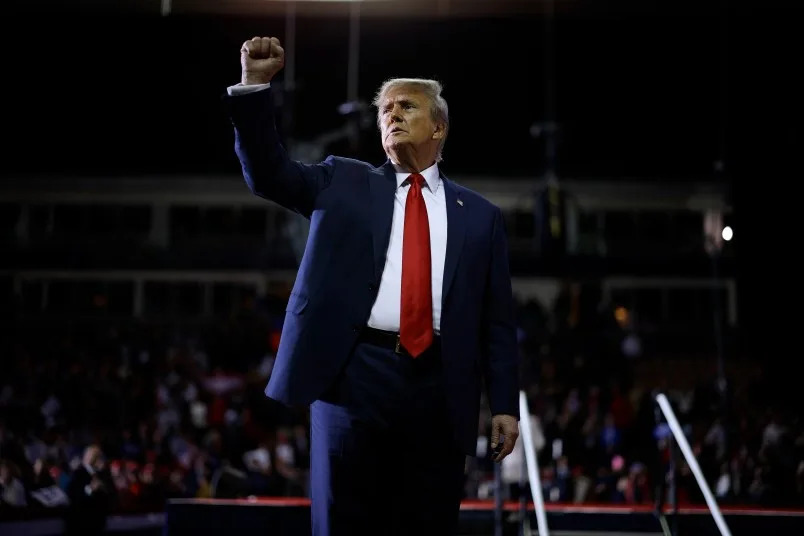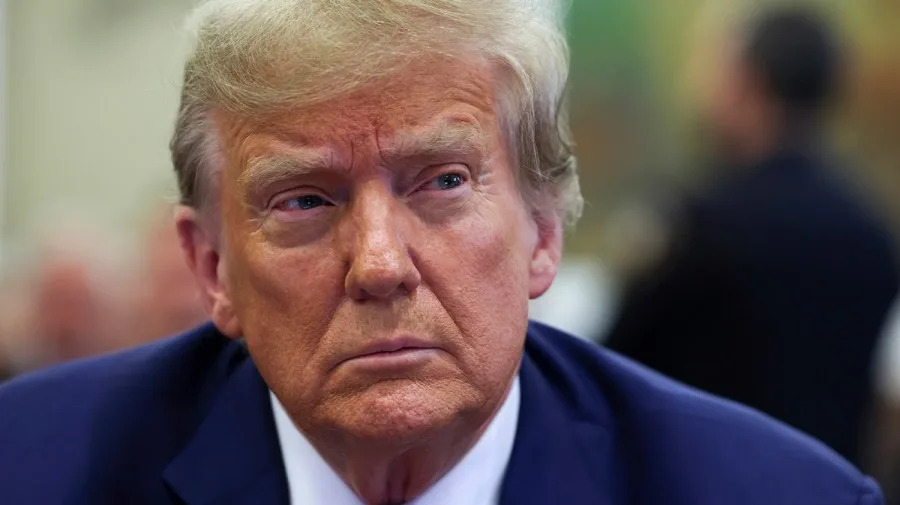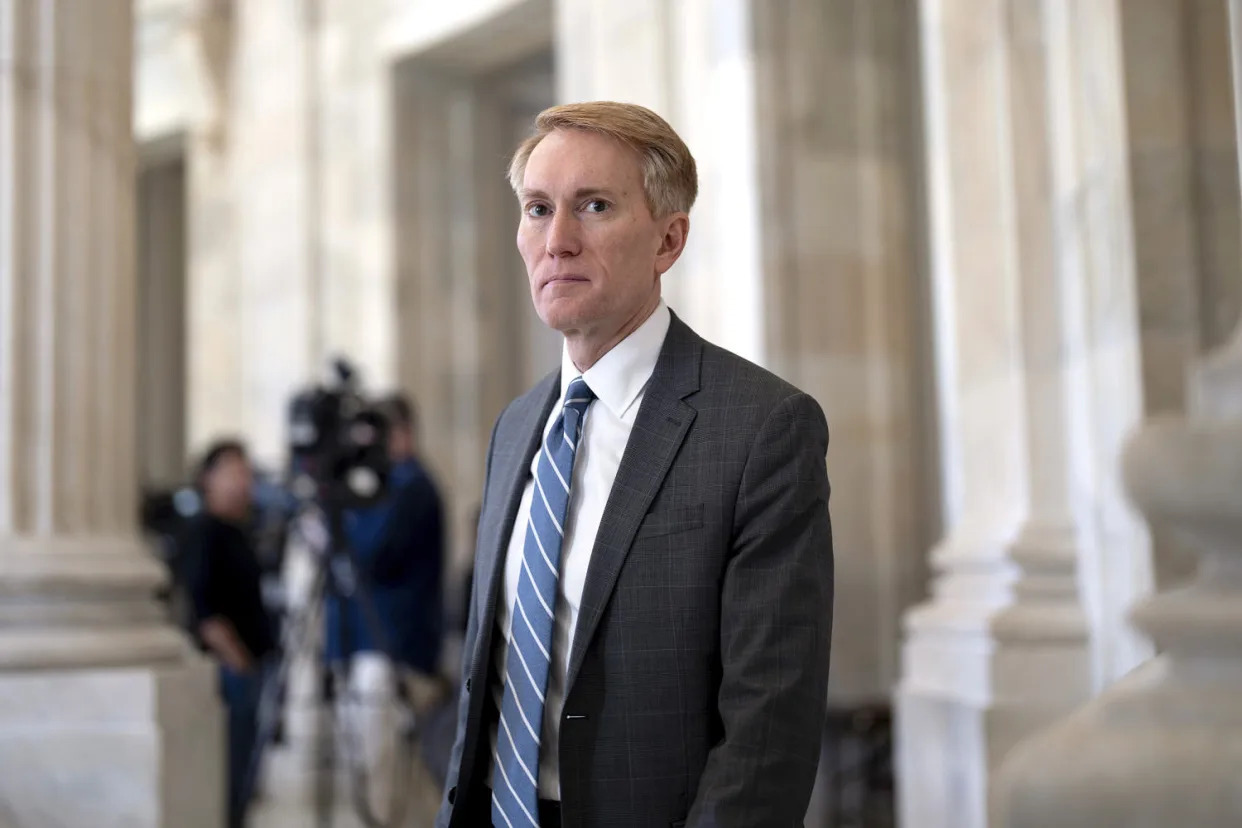TPM
The ‘Nuclear’ Election Conspiracy Doc Trump Cited In Court Is A Sign Of Things To Come
Hunter Walker – February 7, 2024

The true believers were buzzing.
It was Jan. 2 and former President Trump had just used his “Truth Social” platform to release a 32-page “Summary of Election Fraud in the 2020 Presidential Election in the Swing States.” The document rehashed thoroughly debunked claims, promoted blatantly false information, and repeatedly cited other reports that do not actually appear to exist to make the patently absurd assertion there is “no evidence Joe Biden won.” In other words, it was everything many hardcore Trump supporters who refuse to accept his defeat had been waiting for.
On the site formerly known as Twitter where election dead-enders have taken advantage of Elon Musk’s permissive attitude towards right-wing conspiracy theories, a few thousand pro-Trump activists spent nearly 13 hours in an audio chat discussing the document, which they dubbed “The Nucleus File.” But the report was more than an object of fascination for the pro-Trump fringe.
Along with becoming a hot topic in delirious Twitter Spaces, the report was cited in a Jan. 2 federal court filing by Trump’s attorneys, part of a wild strategy to argue he was immune from prosecution in the election interference case brought by special counsel Jack Smith.
The use of a questionable anonymous document to incorporate election conspiracies into his defense raised eyebrows from legal observers, even those who had grown familiar with the former president’s everything-at-the-wall approach to his defense. One lawyer who previously worked for Trump described the move to TPM as not just unlikely to help his case, but akin to bringing up an “alien abduction” before a judge.
“That’ll never get off the ground,” said the lawyer, Ty Cobb, a veteran defense attorney who was special counsel on Trump’s White House legal team during the Mueller investigation and who has since become an outspoken Trump critic.
The D.C. Circuit Court of Appeals ruled against Trump’s team on Tuesday and allowed the prosecution to move forward at the district court level. In their decision, the circuit court panel stuck to the question at hand and completely ignored the assertion from Trump’s legal team that the 2020 outcome was up for debate. Instead, the court flatly declared Trump both an election loser and a danger to the democracy.
“Former President Trump’s alleged efforts to remain in power despite losing the 2020 election were, if proven, an unprecedented assault on the structure of our government,” the judges wrote.
The document may not have had any impact in court, but there are many indications it is part of a larger — and ongoing — project for Trump’s presidential campaign that his activist allies describe as a “nuclear” assault. The promotion of the document by the former president and its use in his legal defense ultimately served as proof that Trump is making the fever dream that he won the last election a part of the current one. Trump is dragging all elements of his political universe with him down the conspiracy theory rabbit hole, including his campaign team, an army of attorneys, Republican Party leaders, and the activists who have driven the false narrative online and are increasingly targeting election infrastructure in the real world.

Early on in the marathon Twitter discussion about the file, a right-wing streamer who has amassed a six-figure following using the handle “Behizy” took the virtual stage.
“What’s up my fellow conspiracy theorist election deniers?” Behizy declared, with evident sarcasm oozing over any potential hint of self awareness.
“I saw the report,” he said. “Who wrote it? Does anyone know?”
“We’re trying to figure that out,” replied Pablo Martinez, the chairman of the Republican Party in McKinley County, New Mexico, who was one of the hosts of the conversation.
“Behizy” actually seemed pleased not to get an answer to his question.
“I like that the author is anonymous because we know the mainstream media will attack the messenger before actually addressing the message,” he said. “So, I think it’s just smart that they intentionally omitted their name from the report.”
The report, however, wasn’t entirely anonymous. One person whose name was all over the document — David Cross — spoke to the crowd a few minutes later. Cross, who is a financial adviser in Georgia, has emerged in recent years as one of several self-styled experts and sleuths who have taken it upon themselves to question the 2020 presidential election results and the integrity of the country’s election systems. Corporate records show Cross is one of three executives at an outfit called the Election Oversight Group, a supposed watchdog organization, along with a man named Kevin Moncla. The EOG has helped file complaints with elections officials in Georgia and created research documents and videos based on debunked allegations. Cross, Moncla, and their organization were cited seven different times in the document shared by Trump and, on the Twitter broadcast, Cross hinted it was just the beginning.
“One of the things that everybody needs to realize about this report is that this is a summary. There’s a bigger report that’s going to be coming later and it’s going to be like dropping a nuclear bomb on all of these states and with all of the ways that elections are manipulated,” Cross declared. “So, that’ll be the next thing that’s coming. So, you’re kind of getting a taste of the big picture in looking at this report. There’s more to come.”
Cross, who did not elaborate on his apparent inside knowledge, then went on to encourage other activists to obtain positions working within election infrastructure. However, he cautioned them to erase their “pro-Trump” digital footprint beforehand.
“You need to be involved as an election worker on Election Day and, if you are going to do that, then go on to your Facebook account and eliminate as much conservative stuff as you possibly can because you will be profiled,” he said. “They will not hire you.”
“Put stuff about, like, you know, your cats, and your flower garden, or your dogs, or fishing. I don’t care, just not political stuff,” Cross said, adding, “Get your ass hired so that you can be part of this and be part of the solution.”
The strategy was an example of how election conspiracy-theory activists are taking their message offline and into the polling places and offices where America’s votes are counted. After outlining his idea for a stealth mission, Cross returned to the report and seemed to indicate he had a hand in writing it.
“We have to close all possible loops for cheating and malfeasance, and I think we’ve done a really good job of exposing that in the report that everybody’s reading or the summary that you’re reading,” Cross said.
Despite seeming to take credit on the Twitter broadcast, Cross denied playing any role writing the report shared by Trump during a phone conversation with TPM on Feb. 2.
“My involvement in that report is just that my work was cited in it, so I didn’t actually write the bullet points that are in there, because what you’re looking at is a summary,” Cross said. “But I am aware that there’s going to be more, because, like I said, you’re looking at a summary, you’re not looking at all the details.”

The Trump campaign clearly played a role in publishing the report. On Jan. 6, four days after Trump shared the “election fraud” summary and his legal team cited it in the reply brief, the Washington Post published a story about the document that claimed “Trump campaign spokesperson Liz Harrington wrote the report.” The Post cited people “familiar with the matter.” Along with reportedly being produced by a Trump staffer, the document was hosted on a URL associated with Campaign Nucleus, a platform used by the campaign. That official web address is what led the excited activists to dub the document “The Nucleus File.”
Harrington did not respond to requests for comment on record. Cross also initially denied being in contact with anyone on Trump’s campaign team, but later admitted the pair had been in contact.
“Liz is really private, and so, I’m not really comfortable talking about what she’s doing or anything like that,” Cross said. “I mean, I can tell you that I’ve had a couple of conversations with her, but it’s all fairly general.”
The Post described Harrington as a “polarizing figure in Trump’s orbit” due to her interest in 2020 election denial. Overall, the reporters framed the publication of the report as evidence of “divisions” on Trump’s team, where some of the staff have tried to tamp down on the election conspiracy theories. A senior former Trump campaign official echoed that notion in a conversation with TPM where they described Harrington as a source of “craziness” and a “challenging” figure for those trying to steer Trump away from the false voter fraud narratives.
Of course, while Harrington or other individual staffers might be interested in election conspiracy theories, at the end of the day, it is Trump himself who shared the report and his lawyers who cited it in a court filing. Still, Harrington seems to be a central figure connecting fringe election activists with the Trump campaign.
Last August, Trump announced a grand plan to unveil a separate report on “the Presidential Election Fraud which took place in Georgia” during a press conference at his New Jersey golf club. According to the New York Times, that report was a more than 100-page document “compiled at least in part by Liz Harrington, a Trump communications aide who is often described as among the true believers in his false claims that the 2020 election was stolen from him.”
Despite Trump’s announcement, the press conference never took place and that Georgia-specific document has, thus far, never seen the light of day.
The Georgia report that Harrington supposedly worked on seems like it may have been referenced in the “Nucleus File,” which contained multiple citations referencing a “Report on Widespread Fraud in the Georgia 2020 Presidential Election” that does not appear to exist anywhere else online. In a conversation last week, Kevin Moncla, David Cross’ partner in the Election Oversight Group, told TPM he is aware of a report on Georgia that is based, in part, on the pair’s research.
“The Georgia portion of that report I know includes some of our work,” Moncla said.
Like Cross, Moncla was somewhat coy when asked about his ties to Harrington.
“I’ve contributed my work,” Moncla said. “I’ll just leave it at that.”
Georgia’s 2020 election result, which has been the focus of much of Cross’ and Moncla’s work and skepticism, has been affirmed in three separate counts overseen by officials from Trump’s own party. The factual issues and logical leaps that plague their work aren’t the only things that make the pair potentially problematic associates for a presidential campaign. Last year, Georgia election officials asked the FBI to investigate a series of aggressive emails they received from Moncla in conjunction with complaints he filed related to the administration of the vote. At least one of those complaints is still being reviewed by the State Election Board. Moncla has also had personal legal troubles. In 2004, Moncla pleaded guilty to a misdemeanor voyeurism charge related to secretly videotaping his former wife and other guests in the bathroom of their home.
When asked about the call for an FBI investigation, Moncla said, “I’m not going to get into the status of it.” And he dismissed the voyeurism charges as an issue that came up in a “personal divorce case.”
“My work stands for itself, I don’t care what people think of me,” Moncla said.
Along with showing links between fringe activists and the Trump campaign, the “Nucleus File” connects the conspiratorial politics to the former president’s legal team. The filing that cited the document used it as an example of evidence that prosecutors are ignoring “the vigorous disputes and questions about the actual outcome of the 2020 Presidential election — disputes that date back to November 2020, continue to this day in our nation’s political discourse, and are based on extensive information about widespread fraud and irregularities in the 2020 election.” Trump’s attorneys, who have argued he has immunity for his conduct on Jan. 6, brought that point up to argue prosecutors had made “legally and factually incorrect” statements in the case. The lawyers who filed the brief citing the report did not respond to requests for comment.

Cobb, the veteran defense attorney and former federal prosecutor who once worked for Trump, theorized to TPM that the inclusion of election conspiracy theories is likely an effort directed by the former president to “relitigate that and complicate the criminal case.” Cobb predicted that strategy would be an utter failure since it is “irrelevant” to the question of whether Trump tried to obstruct an official proceeding.
“As a criminal defendant, you’re basically allowed to say it was an alien abduction,” Cobb said.
While Trump and his attorneys might be able to bring up election conspiracy theories in pre-trial hearings, Cobb predicted the judge would not allow them to take these issues to trial.
“You can get away with a lot argumentatively pretrial, but that’s why this would be a pretrial exercise. … He needs to get through her to be able to raise this at trial,” Cobb said, referencing U.S. District Judge Tanya Chutkan, “and he won’t be able to do that.”
Though Cobb does not expect “The Nucleus File” will make it further into Trump’s case, its inclusion in the filings so far does seem to shed light on the figures surrounding the president. On both his campaign and in his defense Trump has found people who are willing to indulge in the 2020 election fantasies promoted by the former president.
For his part, Cobb said he would refuse to file this type of information for a client and would “withdraw” if they insisted on it.
“There’s right and wrong, and the importance of ethics, and having a duty of candor with the court,” Cobb said, adding, “You don’t perpetrate a fraud upon the court and you try to stop shy of letting your client do it. So this is the kind of thing I would just say no to.”
Trump’s current legal and political operations clearly have no such qualms.











